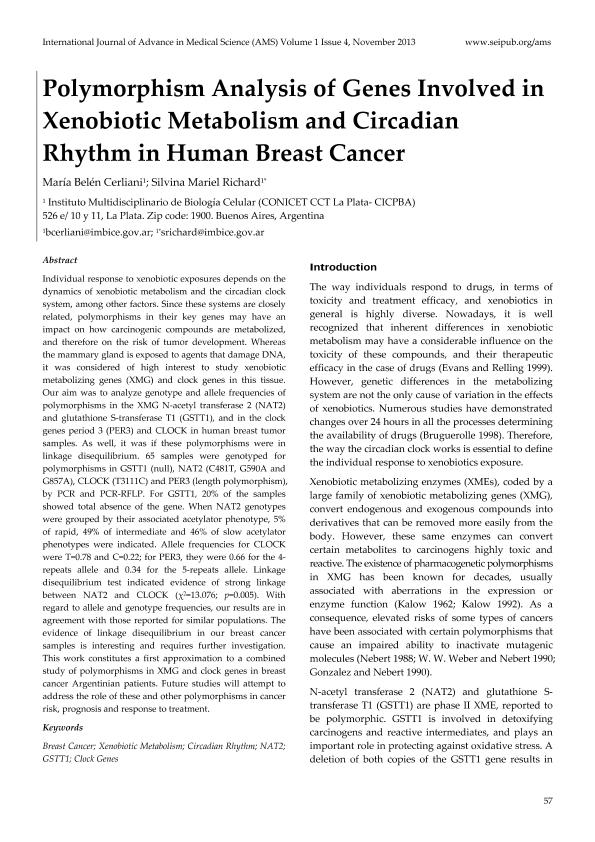Artículo
Polymorphism Analysis of Genes Involved in Xenobiotic Metabolism and Circadian Rhythm in Human Breast Cancer
Fecha de publicación:
11/2013
Editorial:
Science and Engineering Publishing Company
Revista:
International Journal of Advance in Medical Science (AMS)
ISSN:
2327-7238
e-ISSN:
2327-7629
Idioma:
Inglés
Tipo de recurso:
Artículo publicado
Clasificación temática:
Resumen
Individual response to xenobiotic exposures depends on the dynamics of xenobiotic metabolism and the circadian clock system, among other factors. Since these systems are closely related, polymorphisms in their key genes may have an impact on how carcinogenic compounds are metabolized, and therefore on the risk of tumor development. Whereas the mammary gland is exposed to agents that damage DNA, it was considered of high interest to study xenobiotic metabolizing genes (XMG) and clock genes in this tissue. Our aim was to analyze genotype and allele frequencies of polymorphisms in the XMG N-acetyl transferase 2 (NAT2) and glutathione S-transferase T1 (GSTT1), and in the clock genes period 3 (PER3) and CLOCK in human breast tumor samples. As well, it was if these polymorphisms were in linkage disequilibrium. 65 samples were genotyped for polymorphisms in GSTT1 (null), NAT2 (C481T, G590A and G857A), CLOCK (T3111C) and PER3 (length polymorphism), by PCR and PCR-RFLP. For GSTT1, 20% of the samples showed total absence of the gene. When NAT2 genotypes were grouped by their associated acetylator phenotype, 5% of rapid, 49% of intermediate and 46% of slow acetylator phenotypes were indicated. Allele frequencies for CLOCK were T=0.78 and C=0.22; for PER3, they were 0.66 for the 4-repeats allele and 0.34 for the 5-repeats allele. Linkage disequilibrium test indicated evidence of strong linkage between NAT2 and CLOCK (χ2=13.076; p=0.005). With regard to allele and genotype frequencies, our results are in agreement with those reported for similar populations. The evidence of linkage disequilibrium in our breast cancer samples is interesting and requires further investigation. This work constitutes a first approximation to a combined study of polymorphisms in XMG and clock genes in breast cancer Argentinian patients. Future studies will attempt to address the role of these and other polymorphisms in cancer risk, prognosis and response to treatment.
Palabras clave:
Breast Cancer
,
Xenobiotic Metabolism
,
Circadian Rhythm
,
Nat2
,
Gstt1
,
Clock Genes
Archivos asociados
Licencia
Identificadores
Colecciones
Articulos(IMBICE)
Articulos de INST.MULTIDISCIPL.DE BIOLOGIA CELULAR (I)
Articulos de INST.MULTIDISCIPL.DE BIOLOGIA CELULAR (I)
Citación
Cerliani, María Belén; Richard, Silvina Mariel; Polymorphism Analysis of Genes Involved in Xenobiotic Metabolism and Circadian Rhythm in Human Breast Cancer; Science and Engineering Publishing Company; International Journal of Advance in Medical Science (AMS); 1; 4; 11-2013; 57-64
Compartir




